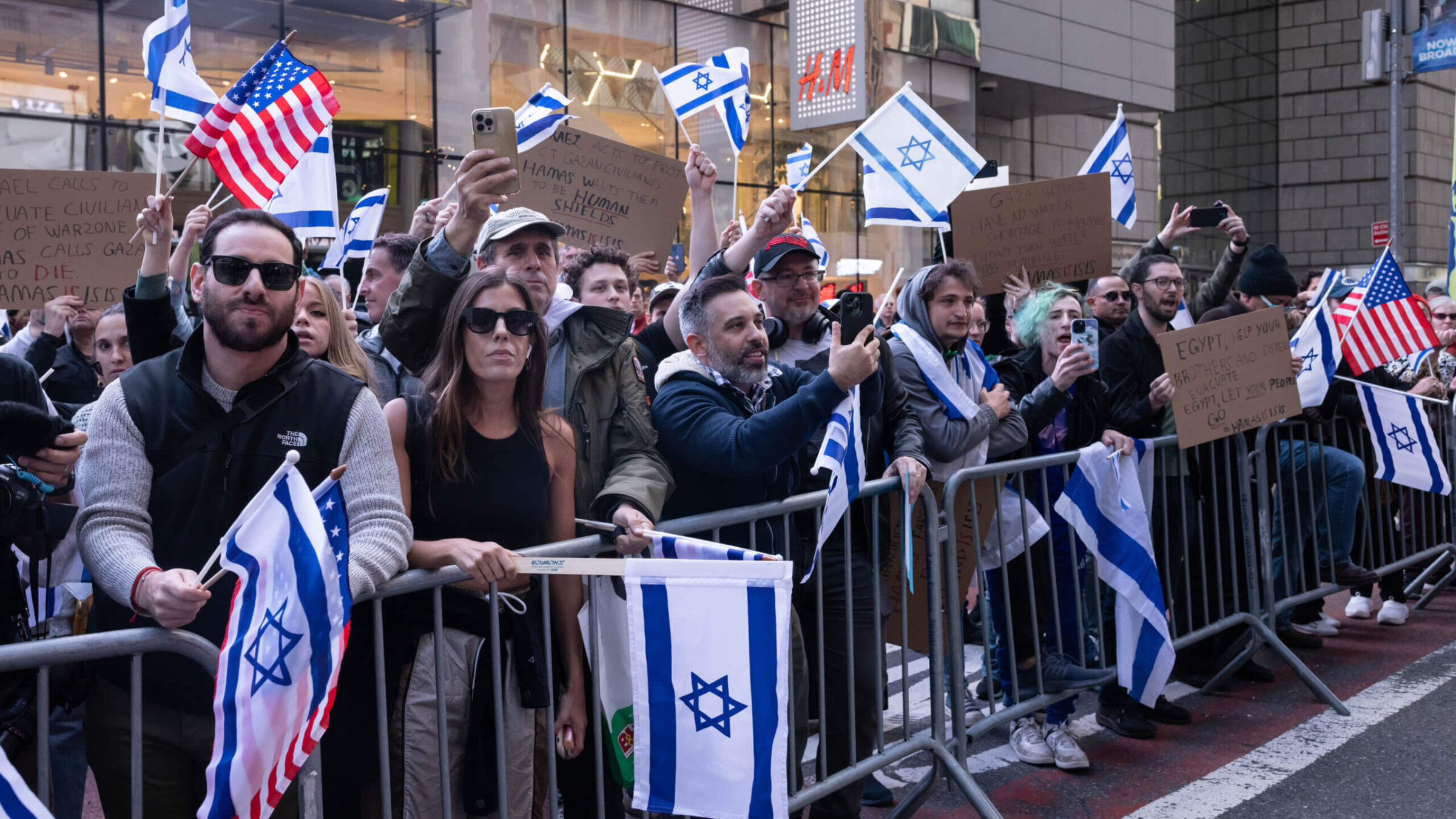What is the ‘March for Israel’ really for?
Its sponsors say it is ‘for Israel, to free the hostages, and against antisemitism’ — goals that sometimes clash

Pro-Israeli demonstrators in Times Square in New York, US, on Friday, Oct. 13, 2023. Photo by Yuki Iwamura/Bloomberg via Getty Images
WASHINGTON — On Tuesday, a large pro-Israel rally is taking place on the National Mall. An estimated 40,000-60,000 people, in partnership with the Jewish Federations of North America and the Conference of Presidents of Major American Jewish Organizations, will march “for Israel, to free hostages, and against antisemitism.”
The march makes sense from the standpoint of Jewish solidarity. It can feel empowering and meaningful to be with like-minded people. But from a policy perspective, this framing confuses more than it clarifies.
This march does not appear to press for a specific change or shift in U.S. government policy. The people coming to Washington, D.C., on Tuesday are coming to a city where the administration and the vast majority of federal lawmakers already agree with them and indeed are supporting Israel in this war.
The march is “for Israel.” But for whom in Israel? The people protesting outside of Israeli Prime Minister Benjamin Netanyahu’s home calling for his resignation, or for Netanyahu and his supporters? For those raising the alarm on the crackdown on free speech in Israel, or those doing the cracking down? For those calling to eliminate Hamas from Gaza or those calling for a cease-fire?
The U.S. government has been full throated in its support of Israel since Hamas’ horrific Oct. 7 attack. The Biden administration is, at present, fully supporting the Israeli government, save for some comments on how “far too many” Palestinians have been killed in Gaza over the past month and pushing for daily four-hour humanitarian pauses (according to the Hamas-run Gaza Health Ministry, over 11,000 people in Gaza have been killed by air and artillery strikes since the start of the war; according to World Health Organization Director-General Tedros Adhanom Ghebreyesus, a child in Gaza is killed every 10 minutes).
The march is also “to free hostages.” This is, of course, a worthy demand: Over 200 people, including young children and the elderly, have been held hostage by Hamas for over a month. They should be freed to return to their lives. But the call to free hostages does not necessarily square with the first demand of standing with Israel, depending on one’s interpretation of the phrase.
Members of the Israeli government have themselves said that securing the release of the hostages is not a priority. Netanyahu reportedly rejected a five-day cease-fire in fighting to secure the release of some of the hostages. In one highly publicized case, Yonatan Ziegen, the son of peace activist Vivian Silver, called for a cease-fire, which many at the march presumably oppose, specifically because he believes it is the thing that he believed would ensure the hostages’ safety.
The march is also “against antisemitism.” Here, too, the march will be more for solidarity than a specific policy change. The Biden administration, the first in U.S. history to release a strategy on antisemitism, has pointedly come out against antisemitism since the start of the war. Both the House of Representatives and the Senate have recently passed resolutions against antisemitism, too.
What’s more, it is undoubtedly true that antisemitic incidents have increased from Boston to Berlin during this war (and past studies suggest this is true more generally in times of crisis and conflict for Israel), the result of people conflating all Jews with the government of Israel.
But this march, in a sense, does the same thing. It is linking support for the state of Israel with the fight against antisemitism in the United States and around the world. (This is not necessarily surprising as it has, for years now, been the preferred policy of many in the organized Jewish world to treat harsh critique of Israel and anti-Zionist rhetoric as antisemitic.)
People will, of course, be at the march on Tuesday for different and varying reasons. And to a certain extent, all of this is by design: The organizers are trying to put up a big tent, so that many across the political and religious spectrum can come together despite disagreements to show solidarity for Israel and as Jews.
Individuals will, of course, know what brought them there, and what they’re calling for. Whether the same can be said of the march overall is another matter. But, then, the march isn’t happening to change government policy, or to change minds. It’s a reaffirmation of feeling: The people at the march will be standing for what they think of when they think of Israel, and for what they think of when they think of Jewish solidarity. That those feelings don’t translate to coherent or specific policy is perhaps part of the point.
To contact the author, email [email protected].















